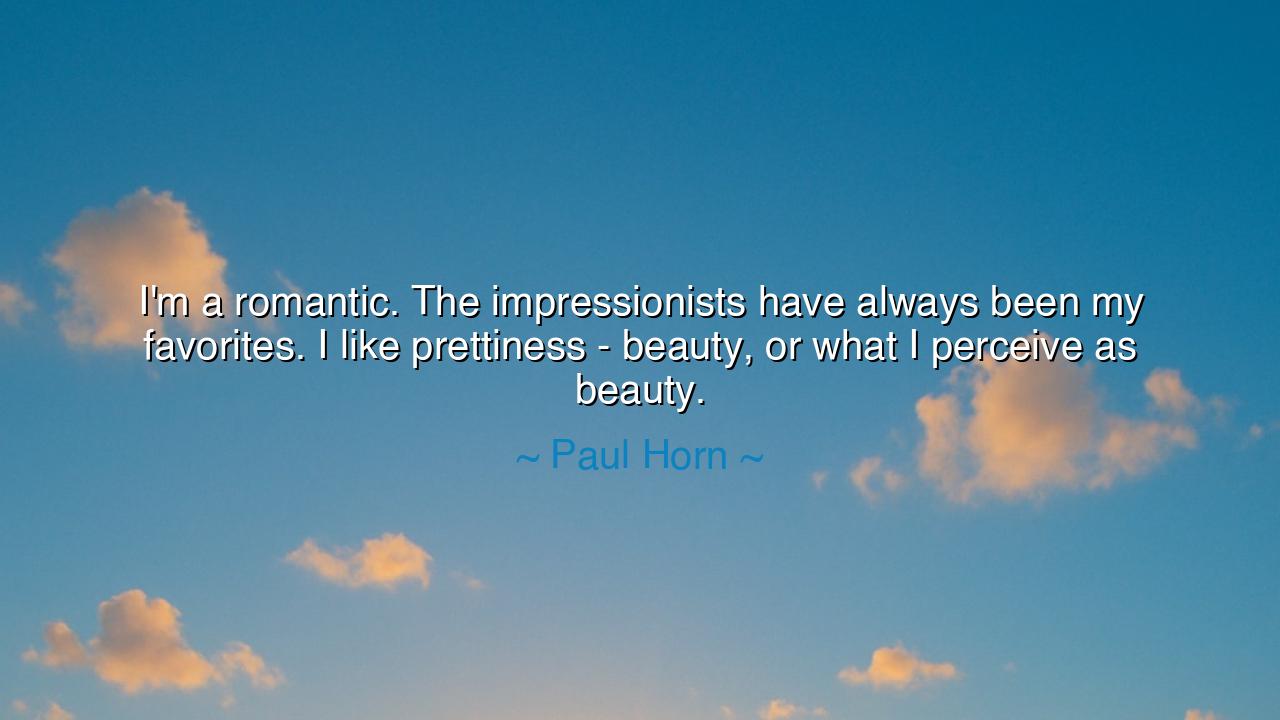
I'm a romantic. The impressionists have always been my favorites.
I'm a romantic. The impressionists have always been my favorites. I like prettiness - beauty, or what I perceive as beauty.






In the words of Paul Horn, musician and seeker of harmony, we hear the song of the heart: “I’m a romantic. The impressionists have always been my favorites. I like prettiness—beauty, or what I perceive as beauty.” These words may seem simple, yet they carry a wisdom that has echoed since the dawn of time: that man is not sustained by bread alone, but by the vision of beauty, by the touch of art, and by the longing for what is gentle, radiant, and transcendent.
The ancients spoke of beauty not as luxury, but as necessity. Plato declared that beauty was the splendor of truth, and that to gaze upon it was to glimpse the eternal. The Impressionists, whom Horn admired, walked in this very spirit. Painters such as Monet, Renoir, and Degas did not seek rigid lines or cold precision, but the fleeting shimmer of light on water, the softness of a smile, the living glow of the world as it passed through the senses. To love the impressionists is to confess one’s longing for tenderness over harshness, for light over shadow, for the ephemeral spark that makes life worth cherishing.
And what of Horn himself, a romantic spirit? His music often reached beyond the boundaries of sound into meditation and transcendence. Like the painters he loved, he sought not perfection in form, but the aura, the feeling, the presence that hovers just beyond reason’s grasp. To declare himself a lover of prettiness and beauty is to declare allegiance not to cold intellect, but to the warm pulse of the heart that seeks joy in the fragile and the fleeting.
History, too, gives us examples of such devotion. Claude Monet, who painted his garden at Giverny again and again, did so not to record it with accuracy, but to capture its shifting essence. In his water lilies, he painted reflections more than objects, emotions more than facts. Critics once scorned him, calling his works unfinished, mere “impressions.” Yet over time the world saw that in those shimmering strokes was the very soul of beauty. Horn’s words echo this truth: beauty is not fixed, but perceived, and the romantic eye finds it even where others see only chaos.
The deeper meaning of Horn’s confession is that beauty is not universal, but personal. “What I perceive as beauty,” he says, acknowledging that each soul holds its own measure, its own lens. For some, beauty lies in symmetry and order; for others, in mystery and softness. To be a romantic is to allow oneself to be moved, to delight in tenderness without shame, to stand in awe at the fragile loveliness of existence.
The lesson, then, is clear: do not scorn prettiness, nor dismiss the gentle in favor of the grand alone. Life is hard and full of struggle, and without beauty—whether in art, music, nature, or love—the soul grows barren. Seek out what stirs your heart, be it the brilliance of the sun upon water, the laugh of a child, or the brushstroke of an impressionist. Guard it, honor it, and let it feed your spirit.
Therefore, O listener, embrace your own perception of beauty without apology. Be a romantic in a world that often worships only power and reason. Surround yourself with the loveliness that inspires you, and let it shape your days. For as Horn reminds us, to see beauty is not indulgence—it is salvation. It is the reminder that life, however fleeting, can be radiant, and that to perceive it as such is to live not only more deeply, but more wisely.






AAdministratorAdministrator
Welcome, honored guests. Please leave a comment, we will respond soon